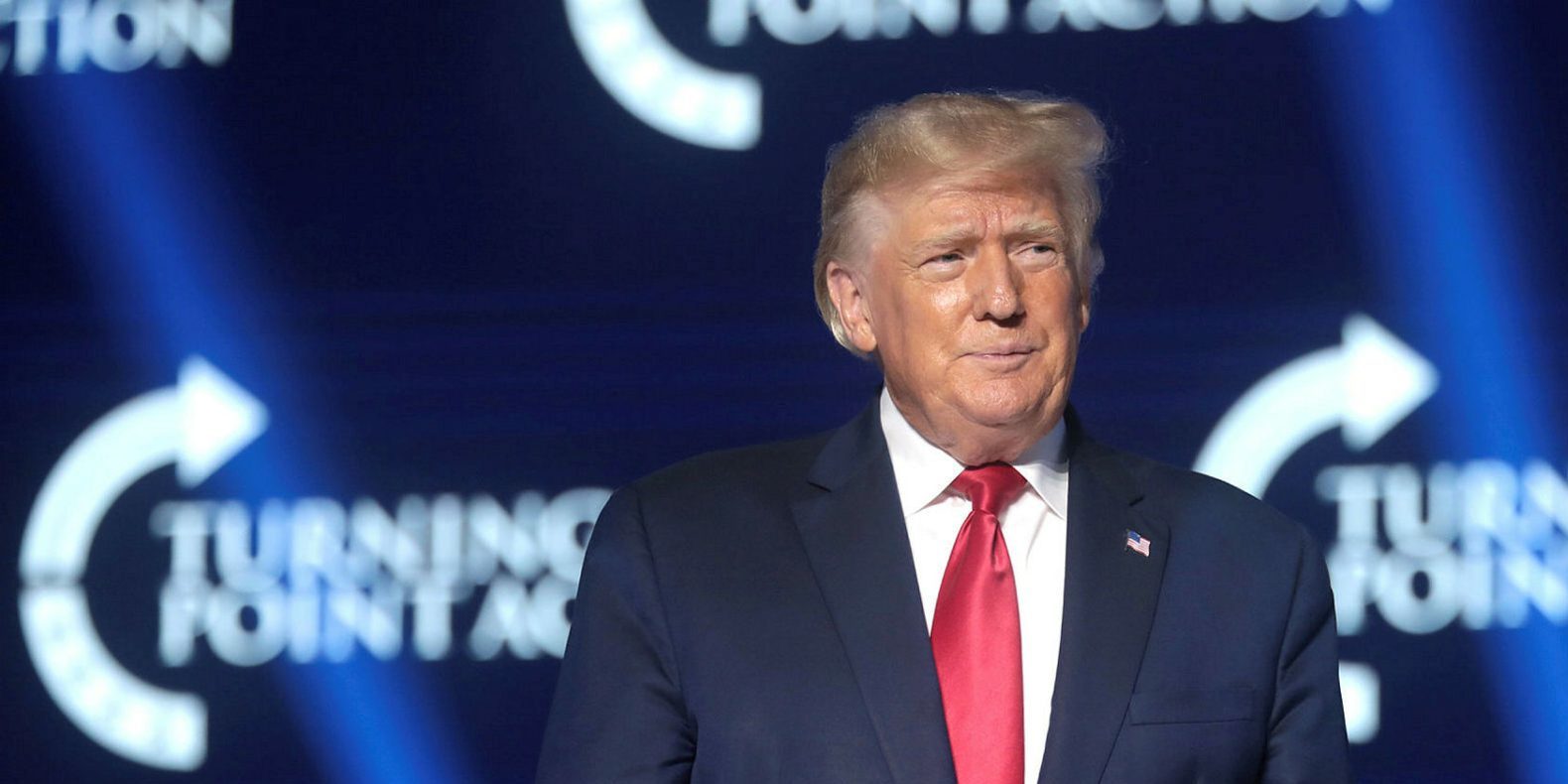Trump-led U.S. an ‘unreliable partner’ for Canada, says expert group: ‘we’re dealing with an administration that doesn’t believe our country has a right to exist’

Former federal Progressive Conservative cabinet minister Perrin Beatty says he had planned to spend Easter with his wife, Julie, at the condominium they have owned for about 12 years in Naples, Florida. But he decided to return last week to Ottawa after United States President Donald Trump announced his “Liberation Day” reciprocal tariffs on April 2.
“We’re dealing with an administration that doesn’t believe that our country has a right to exist,” said Beatty before departing his winter home in a country whose president has repeatedly pushed the idea of annexing Canada as its 51st state.
The sentiments from the former minister in the governments of former prime ministers Joe Clark, Brian Mulroney, and Kim Campbell toward the U.S. under Trump are expanded in a report entitled Broken Trust: Managing an Unreliable Ally released on April 1 by the Expert Group on Canada-U.S. Relations, which Beatty co-chairs.
Under Trump’s presidency, our neighbour to the south “has become an unreliable partner—to the point of hostility,” reads the report.

“International relationships with the United States are no longer the product of collaboration and agreement but of the whims of one man,” who “rejects … moral constraints.”
Through various binational initiatives—from NORAD to trade agreements—Canada and the U.S. “understood that they were stronger and more prosperous when they worked together”—that is, until Jan. 20, 2025, the day of Trump’s second inauguration as president, “when annexing Canada became the official policy of the new administration,” according to the expert group, which includes former Canadian diplomat Colin Robertson and retired Royal Canadian Navy vice-admiral Mark Norman among its members.
Beatty characterizes Jan. 20 as “Canadian Independence Day,” when this country was forced to “take our future into our own hands to provide for our own security and sovereignty.”
As the expert group’s report states: “What reason do we have to assume that a country whose leader questions our very right to exist will come to Canada’s defence if, for example, Russia or China challenges Canada’s Arctic sovereignty.”
If the obligations of the U.S. to protect a fellow NATO member are in doubt, the Trump administration has already demonstrated disregard for its other commitments, such as those under the Canada-United States-Mexico Agreement (CUSMA)—which the president signed in 2020 during his first term in the White House—through “the unilateral imposition of massive tariffs on Canada”—under the “the false claim of a flood of fentanyl and illegal immigrants from Canada … designed to shield the implementation of tariffs from legal challenges,” said the expert group whose work is supported by Carleton University’s Norman Paterson School of International Affairs, and the Canadian Global Affairs Institute.
“Even if we can negotiate an extension of CUSMA and the withdrawal of tariffs imposed by the Trump administration, what is the worth of Donald Trump’s signature?”
Beatty said the fallout extends further. In his view, the U.S. under Trump has “violated and destroyed” Canada’s trust, “which makes it very difficult to continue with the relationship as it once was.”
“There’s been a permanent change in the relationship that even if Trump were to withdraw all the threats and tariffs against Canada, we couldn’t go back to the comfortable, rock-solid assumption that the president of the United States would not try to actively damage Canada,” said Beatty, a former minister of national defence, who also served as secretary of state for external affairs—today’s foreign affairs minister—in the Campbell government.
“This is a dramatic change from what we’ve known since World War II where there has been a confidence that America’s word was its bond.”
In its report, the expert group said that “the dramatic change in U.S. behaviour” requires a Canadian strategy based on three principles: diversifying this country’s trade and security relationships, including through the acquisition of new military equipment; addressing the nation’s declining productivity levels compared to other G7 countries; and “providing for our own security,” and not rely on “a country whose president’s official policy is that we should not exist.”
Beatty said that it will require “a massive exercise of rethinking, rebuilding, and restructuring.”

Carleton University international affairs professor Fen Hampson, the expert group’s co-chair, said that Canada needs to reduce its dependence on the U.S. economically, “and start trading with the world.”
The report suggested that Canada capitalize on its “main comparative advantage” in products that can be sold worldwide, “particularly our commodities, including energy, potash, uranium, critical minerals, seafood, canola, wheat and other agricultural products.”
The report said that to get those goods to global markets, Canada will need to invest in the requisite infrastructure—roads, rail, ports, and pipelines—which will take years to complete, said Hampson.
He said the focus for new markets should be in Asia, “where you have the fastest growing middle-class in the world and a real demand for commodities.”
“It’s not just China—it’s India, the Philippines, Indonesia, Vietnam, plus the industrialized economies: South Korea and Japan,” Hampson said.
During the current election campaign, Carney said “there are partners in Asia” with whom Canada “can build deeper ties,” but qualified that “the partners in Asia that share our values don’t include China.”
Also recommended in the expert group’s report is the creation of a federal cabinet-led “situation room,” supported by senior officials from key government departments—such as Global Affairs, Finance, and the Privy Council Office—that would be “tasked to prepare for worst-case scenarios arising from the actions of the Trump administration and their impact on Canada’s economy and national security.”
“Its role must be predictive, prescriptive and, where possible, preventive to head off a crisis before it occurs,” said the expert group, which also suggested that the situation room “would support—or potentially replace the cabinet committee on Canada-U.S. relations (chaired by Prime Minister Mark Carney and that also includes national security) and the Prime Minister’s Council on Canada-U.S. Relations.”
Following his first call with Trump on March 28, Carney said in a statement that the two leaders “agreed to begin comprehensive negotiations about a new economic and security relationship immediately following the election.”
However, the expert group advised that while Canada should expect to live in a tariff world during the Trump era, it should exercise patience when negotiating a new trading regime. Tariff-driven price increases in the U.S. could pressure the Republican administration to “dial back” on duties or change the tariff strategy “dramatically” should there be backlash from right-leaning politicians or their supporters in the 2026 mid-term elections.
Canada must also be ready for the Trump White House to insist that everything should be on the negotiating table, “including sectors that have traditionally been no-go zones for Canada,” such as the supply management system that sets quotas and prices for the dairy, poultry and eggs sectors, said the report.
In an interview with Fox News on April 2, People’s Party of Canada Leader Maxime Bernier said that Canada should commit to ending supply management “right now” before CUSMA is scheduled for renegotiation beginning in July 2026.
The expert group said that if the U.S. “demands significant concessions” on supply management, “we should insist that they reciprocate and lower, if not eliminate, their agricultural subsidies in the dairy and poultry sectors.”
“Our farmers cannot compete without a level playing field,” said the report, which noted that before negotiations begin with the America “Canada should decide what is essential to preserve, what we are prepared to concede, and what we want from the U.S.”
Hampson said that with the American push to manufacture vehicles at home and to slap tariffs on those made in Canada, the U.S. needs to highlight that Canada is “the biggest export market for U.S. autos, and we’re the fifth-largest market for cars in the world.”
“If their goal through escalating tariffs is to kill the auto industry in Canada, we can tell them that we will put 100-per-cent tariffs on every car and truck that’s made in the United States ensuring that they will never sell another car or truck in Canada,” he said, adding that Canada should look to Europe and Asia to produce and sell vehicles here.
As the expert group concluded in its report: “the world was a dangerous place before Donald Trump’s election” as president, and “has been made more perilous by his … replacement of the rule of law with the rule of power.”
Could the president’s plan to use “economic force” against Canada descend into a display of military might against its northern neighbour?
In an essay published on The Conversation back in February, University of Toronto political science professor Aisha Ahmad warned that if Trump’s relentless threats to annex this country led to an American military invasion, the result would be “a decades-long violent resistance, which would ultimately destroy the United States.”
Beatty said he doesn’t believe that would ever happen, and views that scenario as “fanciful stuff” and “more of the makings of a Hollywood movie.”
But maybe within the reality of Trump’s verbal and policy threats to Canadian sovereignty, there’s a happy ending to the soured story of a longstanding cross-border friendship.
“I don’t expect to see the hostile relationship that he has created lasting over the longer term,” said Beatty, the former president and CEO of both the CBC and the Canadian Chamber of Commerce. “I hope common sense will prevail.”
The Hill Times
Expert Group on Canada-U.S. Relations
Co-chairs: Perrin Beatty and Fen Osler Hampson
Signatories: Thomas d’Aquino, Carlo Dade, Martha Hall Findlay, Jonathan Fried, Lawrence L. Herman, Gary Mar, retired vice-admiral Mark Norman, Vincent Rigby, Colin Robertson, John Weekes
Broken Trust: Managing an Unreliable Ally
•Executive summary: The United States, under President Donald Trump, has become an unreliable partner. Its longstanding allies can no longer be confident that America will respect its commitments to come to their defence or respect its economic agreements. That is particularly true for Canada.
•This report identifies concrete measures to mitigate Canada’s risk of depending on an ally, trading partner, and neighbour who has become unreliable to the point of hostility.
•The report urges the federal government to create a dedicated, cabinet-led “Situation Room” to analyse problems, coordinate government responses, solicit input and collaboration with the provinces and the private sector, and propose solutions to the successive crises that Canada will be forced to contend with during the Trump presidency.
•In addition, it offers a series of recommendations about how Canada’s next government should negotiate with the Trump Administration on tariffs and broader trade and security matters.
•The report argues that Canada should resist the temptation to rush prematurely into negotiations with the Trump administration until there is greater clarity in the current political mayhem in Washington about where the administration’s trade policies are ultimately headed. Source: Broken Trust Managing an Unreliable Ally.





 LICENSING
LICENSING PODCAST
PODCAST ALERTS
ALERTS













